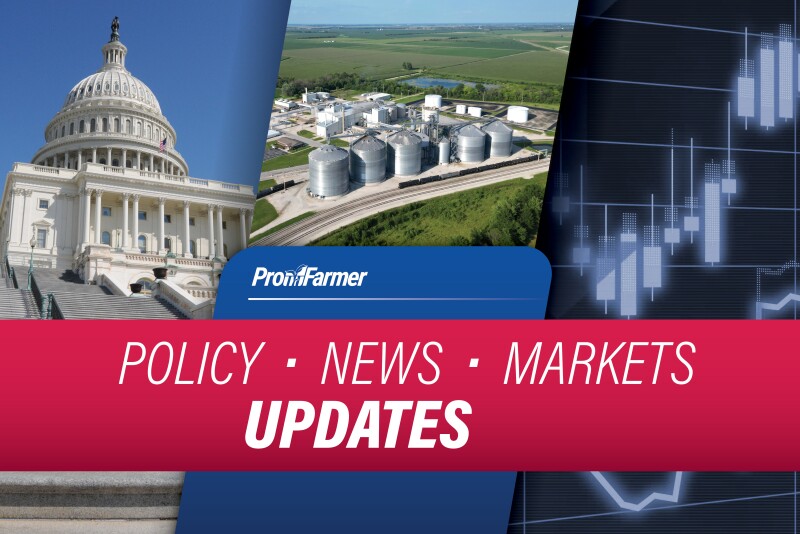Bessent: China must act to ease trade tensions; U.S. near India trade deal... Treasury Secretary Scott Bessent in a CNBC interview said it’s up to China to de-escalate trade tensions, citing the 5-to-1 U.S. trade deficit and warning current 145% (China) and 125% (U.S.) tariff levels are unsustainable. Bessent described U.S./China talks as unclear and slow, noting no confirmed communication between presidents Donald Trump and Xi Jinping.
However, progress is faster with other countries. Bessent highlighted strong advances with India, Japan and South Korea, with a U.S./India trade deal possibly just weeks away.
China vows to stand strong against ‘bully’ Trump... China’s top diplomat warned countries against caving to U.S. tariff threats, as the Trump administration hints at the possible use of new trade tools to pressure Beijing. Chinese Foreign Minister Wang Yi said appeasement will only embolden the “bully” at a BRICS meeting on Monday, rallying the group of emerging-market nations to fight back against U.S. tariffs. The stern remarks show China intends to resist pressure to enter trade talks even as Bessent suggested Washington could ban certain exports to China to gain leverage.
Trump administration eases auto tariffs to protect U.S. manufacturing... Adjustments were made to recently imposed automotive tariffs, aiming to lessen their impact on U.S. car manufacturers. Key changes include easing duties on foreign parts assembled domestically, preventing the “stacking” of tariffs on vehicles and raw materials, and offering partial reimbursement — up to 3.75% of a vehicle’s value — for tariffs already paid. While the 25% tariff on imported cars and parts remains, the modifications are designed to prevent supply-chain disruptions, avoid sharp consumer price increases and give automakers time to expand U.S. operations.
Legal battles over Trump’s tariffs could jolt markets... Thirteen U.S. states have launched legal challenges to President Donald Trump’s sweeping use of tariffs, aiming to both invalidate the current measures and curb the executive branch’s authority to impose them unilaterally. As Tom Essaye writes in The Sevens Report, “The tariff drama will soon enter a new phase — a legal one,” and the outcome “has the potential to substantially move markets.”
Two major lawsuits filed: Twelve states (including New York, Illinois and Oregon) filed jointly, while California filed a separate lawsuit. Both claim Trump’s tariffs, enacted via the International Emergency Economic Powers Act (IEEPA), overstep legal authority. Trump used IEEPA after declaring an economic emergency on April 2 to justify the tariffs. But as Essaye notes, “IEEPA was actually designed to limit presidential power” and has historically been used for sanctions — not trade policy.
The U.S. Court of International Trade will hear the cases with a three-judge panel. “No president has used IEEPA to levy tariffs against trading partners,” Essaye emphasizes. The rulings could eventually be appealed to the Supreme Court. If the states win:
- “Massive rally in stocks,” with S&P 500 surging 2%-plus
- Tech, consumer discretionary, financials and industrials lead gains
- Dollar index rises sharply, Treasury yields drop
- Gold drops “hard,” while oil rallies on trade optimism
If Trump Wins:
- Modest S&P 500 decline (less than 1%)
- Defensive sectors outperform; tech and discretionary lag
Gold continues rallying on “policy chaos,” dollar and Treasuries fall Essaye concludes that while legal resolution may take months, “we should start hearing more about these challenges” later this summer — and they “will have the potential to move markets.”
CNN poll: Trump marks 100 days with lowest approval rating for new president... As President Trump marks his 100th day in office, a new CNN poll finds widespread dissatisfaction with his performance. Trump’s approval rating stands at 41%, the lowest for any newly elected president at this milestone since Eisenhower. Only 22% strongly approve of his performance.
Partisan divides remain stark, with 86% of Republicans approving and 93% of Democrats disapproving. Independent voters show only 31% approval.
Economic perceptions have worsened sharply: 59% believe Trump’s policies have damaged the economy, as stock market losses, declining 401(k) values, persistent food inflation and a collapse in consumer sentiment (second-lowest since 1952) weigh heavily on public opinion.
U.S. secures water deal with Mexico, easing crisis for Texas farmers... USDA Secretary Brooke Rollins announced a major breakthrough with Mexico to meet immediate water needs for Texas farmers under the 1944 Water Treaty. Following high-level negotiations backed by President Trump, Mexico agreed to transfer water from international reservoirs and boost U.S. water shares in six Rio Grande tributaries through October 2025.
Key details include:
- Immediate relief: Short-term water deliveries for the current growing season.
- Ongoing commitments: Monthly transfers and consultations to enforce compliance.
- Economic impact: A $280 million USDA grant to the Texas Department of Agriculture will aid producers harmed by past shortfalls. Without this, Texas A&M estimated economic losses nearing $1 billion.
- Political dynamics: Agreement came after Trump halted water shipments to Tijuana and issued tariff threats, pressuring Mexico to act.
- Stakeholder response: U.S. officials praised the deal as a major win; Texas farmers welcomed the relief but stressed the need for long-term solutions.
U.S., Mexico reach agreement to combat screwworm outbreak... The U.S. and Mexico reached an agreement on the handling of New World screwworm, Rollins said late Monday. Rollins noted the two countries reached “a good solution” and promised details soon. Through a social media post, Mexico’s Secretary of Agriculture, Julio Berdegué, also confirmed that measures to contain and eradicate screwworm were satisfactorily addressed.
The deal came after Rollins issued an ultimatum, threatening to restrict livestock imports if Mexico did not remove barriers hampering U.S. eradication efforts.

